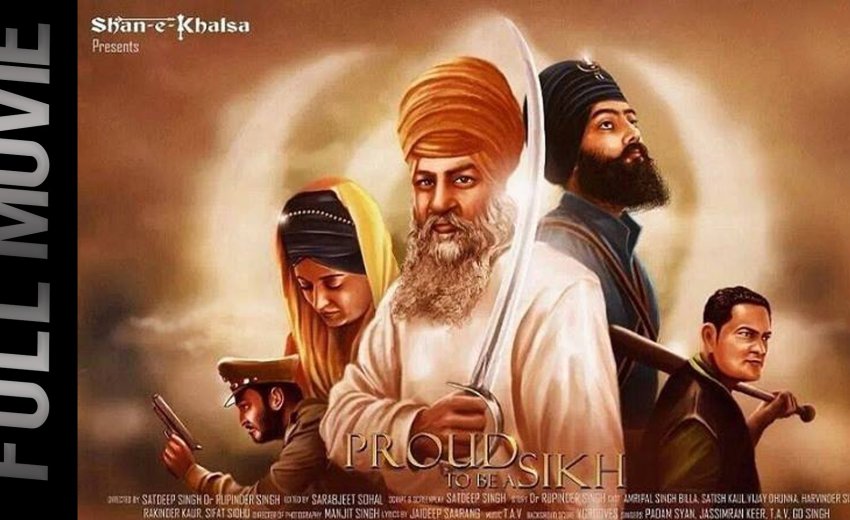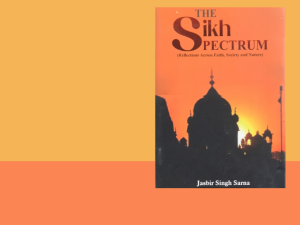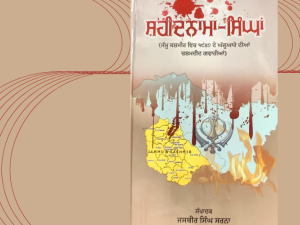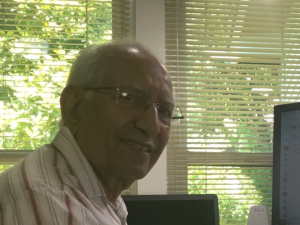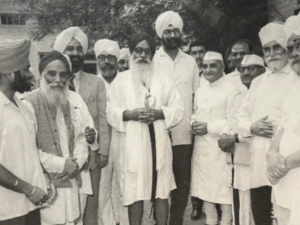Questions Others Ask:
I cannot recall any one asking this question: ‘was I a Sikh’, either during my childhood in Pakistan, or in India after Partition of 1947. There were two exception; at the time of census, and at the time of school registration. It never worried me either, as more than once, I was honored by the major Sikh institutions and elected to serve as a leader of Sikh organizations and Sikh institutions.
If someone did ask me if I was a Sikh, I found no hesitation in answering “yes,” in a persuasive tone. The question was undemanding, the answer was easy. And the matter was swiftly concluded!
After I migrated to North America, the situation began to change. The frequency of grilling questions on the religious identification has increased in the past few years. The questions are evolving into rhetorical-debates. When the question is rhetoric, lengthy answers are expected. Here is a trap; emphatic answers are taken as pretentious, even as ‘downto- earth’ answers are not considered adequate. Anything in-between carries the failings of both of these.
Such questions are no surprise to me. I am a stranger to many and not visibly recognizable as a Sikh. But it is still not a big deal. To a simple question: I politely answer in the affirmative that I am a Sikh. If some one persists with additional questions, I further qualify myself as a Sehajdhari Sikh. The matter usually ends; except sometime I may have to explain politely what a Sehajdhari Sikh is.
Sehajdhari Sikhs are those who ‘adapted’ Sikh religion: Sikhee, by choice, often without being born in a Sikh family. For all purposes they are devout Sikhs professing Sikh religion, observing Sikh ceremonies and considering themselves as an integral part of the Sikh society. They may not conform to five Ks but must believe in all institutions of Sikhism including Khande di Pahul. They have long history of serving the Sikhs and Sikh institutions since the time of the Gurus. Quite a large number of the Sikhs who live outside Punjab (including outside) India belong to this category or denomination.
The Question I Ask:
Situation changes completely, when I ask myself this question, “How much of a Sikh am I?” and when the term ‘Sikh’ is not a noun but an adjective. Then a probing of my own consciousness begins. It is accompanied by a stomach-churning experience. Must it not be a lifelong probe and continuous prayer in humility? I ask myself. The question then become not so easy to answer; nor is the answer that straightforward.
Sikh: A Noun, an Adjective, or a Verb?
To avoid controversy, clever linguists use plural for adjectives, as well as nouns, so that the distinction that I wish to make here is left to the subtlety and appreciation of the listener. This way the translator is unrestricted to choose from the imaginations.
But really there is a difference. The noun in Sikhee is static, the adjective dynamic. The noun is comforting, the adjective demanding. The noun asserts, the adjective pleads. The noun is worldly, the adjective spiritual. That is why I make fuss between “Sikh” and “a Sikh.” Certainly it becomes not a ‘yes-or-no’ matter; the question becomes rather, “How much of a Sikh am I?”
I cannot be confident in laying claim to any large or small share of Sikh-ness and say, Oh, I am very Sikh indeed. That answer will be both arrogant, and untrue. However, can I absolve myself by admitting that, alas, I am hardly Sikh at all?
This will be cowardly and considered irresponsible, even though it may make me aware of how little Sikh I really am. Although discouraging, it will give me a powerful drive to strive that I ought to be more Sikh than I am.
Definition:
To me the most important Sikh belief or Sikh commitment that I am asked to carry is to live according to the teachings of the Sikh scripture Sri Guru Granth Sahib. By the same belief all other requirements to be Sikh become derivatives. They may be more important when term ‘Sikh’ is used as a noun.
Millions of Sikhs are endeavoring to follow the manifold teachings of our ‘Eternal Guru’. It will be a rude assumption to pick on one or the other teaching to define someone whether one is a practicing Sikh or not. That will only cause confusion and unpleasantness. If practicing all what our Eternal Guru is asking of us defines a Sikh, then I am still seeking, learning and endeavoring. Those who can practice all of the teachings are really blessed and I must look up to them as soon as I can spot them. Only with their support and at the feet of the SHABD Guru that I become aware of how little Sikh I really am!
This gives me a haunting but powerful sense that I ought to be more Sikh than I am.
Dynamism:
As you can see, the answer to the question acquires a dynamic quality because the response varies from day to day and Sikhee is perpetual learning. The first of my two questions “am I a Sikh” need to be answered usually once; a tick in the appropriate column of the Census report or the membership application of a local Gurdwara, will carry over from one year to the next. Most of my friends do not change their formal “religion,” and neither do I. If some one asked me, “Are you a Sikh?” a decade ago, I should not expect him or her to repeat the question this year, unless my response was forgotten.
When the term Sikh is used as an adjective, “Am I Sikh?” becomes as a lifelong and life style issue.
Perhaps yesterday morning, for a brief spell, I was indeed fairly Sikh in my starting of the day with a deep sense of gratitude and thoughtful readings from Sri Guru Granth Sahib. I followed it by treating my fellow drivers humanely as I zoomed to my work. At work I was diligent and honest.
But I was perhaps ‘poorly Sikh’ in the evening when I yelled at the cleaning lady at the office and overlooked any courtesy to other drivers at rush hour!
How much Sikh was I yesterday when I saw a hungry homeless person, standing in the heat of Arizona sun, and drove away in my air-conditioned car? How Sikh was I last year when I voted in the American elections, on the issue of food stamps for the poor, rights of women, or banning the human field mines?
Do you find that there are certain issues when you feel usually less Sikh in your dealings with other fellow humans? The issues are not only ethical: but in the deep, they are questions how Sikh am I doctrine wise.
Was I truly Sikh as I spoke to the congregation last Sunday? Was the congregation truly Sikh when it formulated the election bye-laws to exclude others? How Sikh are we as we hammer out a hateful liturgy on comparative religion, or the religion of our neighbors?
‘For Sikhs Only’:
A few years ago I was reading an article on a Sikh Gurdwara. I came across a sentence saying that the Gurdwara was a house of worship for the Sikhs. We read such assertions every day.
Does that mean that others aught not to worship or share langar there? Should we not recite in our Gurdwara the following Guru Granth Verse addressed to a Muslim?
auTu PrIdw aujU swij subh invwj gujwir ] [Fareed, Sri Guru Granth Sahib: 1381] Rise up, Fareed, and cleanse yourself; chant your morning (Muslim prayer)
Are we not shocked first at the arrogance of our co-religionists, and the more profoundly at the self-righteousness of our excuses?
That sin of labeling a place of worship for a Sikh only is threatening to the faith itself. Although at the level of being a Sikh, one may not think of it as unsettling, the illustration is pertinent to the present topic under discussion. Theologically, no sensitive or decent Sikh could patronize that tender but it is done routinely by those counting themselves as Sikhs.
A Gurdwara that excludes those who are not Sikhs, by the same act, excludes those who are Sikh. Noun and adjective are here torn shredding apart. Guru Nanak said AweI pMQI mgl jmwqI: meaning the best religious path is the one that includes all voyagers.
Origin of Sikh Terms:
Who were those who were first to be called Sikhs and when did these terms come into literature? When the noun and adjective terms, as we used them today, came into existence? I have not searched much. Some one could make a thesis research project to investigate this particular point more thoroughly. However, one may cite the following:
Bhai Gurdas wrote extensively in his Sixteenth century compositions on who is Sikh; let me quote only one verse as:
gur isKI bwrIk hY KMfy Dwr glI Aiq BIVI] [Bhai Gurdas, Vaar 11, Pauri 5] To be Sikh is walking on a very sharp path. It is like walking on the blade of a sharp sword and walking through a tightly narrow alley.
In modern times, the sensitivity perhaps arose only a century ago. Colonial powers wanted to count communities for electoral powers through head counts.
The Sikh matter was spearheaded by the premier Sikh organization, Shromani Gurdwara Parbandhak Committee (SGPC). SGPC undertook to define a Sikh for the purpose of census and for the purpose of a manual being prepared for those taking initiation of khande di pahul. The terms as we use them today were mostly developed there.
This was no different for Sikhs. It was becoming a fashion with all Indian communities who came under pressure to define their constituents.
SGPC invited representatives of all shades and opinions for long deliberations. Like with all other religions, particularly the minority religions, Sikh clerics and politicians introduced Sikh definitions. The first draft was then debated by sub-committees and the community for next fifteen years or so. I was included in the deliberations through my colleagues in the All India Sikh Students Federation at the time when the consensus was eventually solidified into a published text. The text was certainly not without a touch of selfcenteredness and some missionary zeal but, with only few exceptions, everyone was on the same page and content. There was a genuine effort to preserve both the noun “Sikh” and the adjective “Sikh”. With very few exceptions, the effort was welcome by all Sikhs of that age and time.
Two Tier Definition:
SGPC succeeded in providing the best yet definition, a part of which de fined “a Sikh” and remaining defined “Sikh.” A Sikh was one who committed to be a Sikh and did not claim affiliation to any other religion. In contrast, Sikh was defined in term of faith to live by such sacred beliefs that were incorporated in the Guru Granth Sahib.
Like in the times of the Gurus, the Sikh leadership and the Sikh organizations then began to court all those who defined themselves Sikh. Those were the populations who would help swell the Sikh ranks and fill the voter banks. They would donate resources for the growth of the Sikh communities. They filled the population ranks of Northern India and were spreading out around the world. Poets and writers alike were describing both East and West Punjab to be the land of the Gurus meaning the over-whelming populations followed Guru Nanak for the health of their body and soul.
Most often quoted is the description by a famous Sikh thinker who himself was attracted to Sikhi after fluting with Buddhism for a while. Professor Puran Singh used to say,”Panjab na Hindu na Musalmaan, Panjab jeenda Gura(n) dey naam te. It meant: “Punjab is neither Hindu nor Musalmaan; Punjab lives in the name of the Gurus, His time of Punjab is currently populated by over 300 million people.
But within three to four decades all began to change. India was partitioned and the Sikhs were driven out of Pakistan to settle in India and abroad. India chose to be a secular country and it abolished electoral representation based on religion. Only place where the Sikhs were to play the voting game was to manage properties and wealth associated with the Sikh gurdwaras. The politicians would now divide the Sikh communities into the voting banks for the control of Gurdwara properties.
They would use the weapon of definitions to eliminate those who might differ with them. They would even ask the county’s court system to disqualify segments of the Sikhs that they wanted to disfranchise.
Thus, we dismembered the two tier definition of “Sikh”. We have gotten used to the term over a few decades. We are becoming accustomed to employing it so haphazardly and irreverently to suite our selfish intentions. During the process, we have lost any clear grasp of why I should be hesitant in responding to the question, “Are you a Sikh?”
Sikhee worth the Head:
Bhai Mani Singh, accepted martyrdom to help us remember our commitment. He was the high cleric of Sri Harmandir Sahib and Akal Takht, and was martyred in protecting our sacred institutions three centuries ago.
A Sikh youth, Bhai Hakikat Rai, similarly followed Bhai Mani Singh’s footsteps. And, there were many more.
In those days, history reminds us, the term Sikh designated not those who had privileged entry to exclusive organizations or clubs, or just to exclude others from sharing any power, but those whom the rulers of the land had marked out for scalping their skulls. Yet “we are not worthy of Sikhee”, responded those to whom the term applied.
Every Sikh responded to the executor. I must accept the Sikh identity; not as something of which I am worthy, but as something to which I aspire in the presence of my Guru. You put me to death because I say I am Sikh. I hope that you find me worthy - not that much in name, but in my capacity to stand by my beliefs.
Bhai Mani Singh and thousands of others who gave their life for their belief were actually following the footsteps of their mentors like Guru Arjun and Guru Teg Bahadur.
They who endured extreme sufferings to protect their belief in universal religious freedom and human rights.
The Sikh scripture supports this allegiance as: jau qnu cIrih AMgu n morau ] ipMfu prY qau pRIiq n qorau ] [Kabir, Sri Guru Granth Sahib: 484] Even if you cut my body apart, I shall not pull my limbs away. Even if my body falls, I shall not break my bonds of love with YOU.
If today we recaptured the martyr’s belief it would add quite a new quality to our thinking of our belief and brags, and perhaps to our mode of living. It may reshape a little more than the otherwise undeserved application to us of the term “Sikh,” which to the martyrs and protectors of human rights evidently meant much more . Evolution of the Term:
I attempted to investigated certain facets of the evolving history to understand the use of the adjective “Sikh”; and have discovered some quite startling examples. To cite one is an instance from the life of Guru Arjun.
The fifth Guru once wished to award a coin to a performing bard in his congregation on behalf of each Sikh. He offered four and half coins, and announced that the half coin was on his own behalf. He further elaborated that he was counting each of his predecessor Guru as full Sikh and himself an half Sikh because he had not reached the level of spiritual evolution and practices required of full Sikhs.
To help you appreciate the event described let me remind you that Guru Arjun compiled most of the Scripture that we esteem today as our eternal SABD (Word) Guru. Thus, he set in stone the theology that we live by. His labeling of himself as half Sikh, although an instance of extreme humility was nevertheless an example of a deep meaning and future guidance. He was constructing a scale with which to measure one’s Sikhee.
Scriptural Support:
We can also go to our scripture to seek guidance in this matter. Guru Gobind Singh asked us in no uncertain terms in his last sermon on October 20, 1708, that we ought to surrender to Sri Guru Granth Sahib for an answer when in doubt.
But I am petrified regarding what my eternal mentor might tell me on being Sikh if I asked the scripture to give a definition of Sikh. As a way around my timidity, let me ask instead what my Guru would say in another but a similar situation.
There were many Muslims who regularly came to the Guru’s presence to seek guidance. If any one of them wanted to claim himself as Muslim, the Guru would humble him or her by saying the following (see page 141 in Sri Guru Granth Sahib).
muslmwxu khwvxu musklu jw hoie qw muslmwxu khwvY ] Avil Aauil dInu kir imTw mskl mwnw mwlu muswvY ] hoie musilmu dIn muhwxY mrx jIvx kw Brmu cukwvY ] rb kI rjwie mMny isr aupir krqw mMny Awpu gvwvY ] qau nwnk srb jIAw imhrμmiq hoie q muslmwxu khwvY ] ‘It is tough to be called Muslim; if one is truly Muslim, then he/she may be called one. First, let one savor the religion of the Prophet as sweet; then, let his pride of his possessions be scraped away. Becoming a true Muslim, a disciple of the faith of Mohammed, let him put aside the delusion of death and life. As he submits to God’s Will, and surrenders to the Creator, he is rid of selfishness and conceit. And when, says Nanak, he is merciful to all beings, only then shall he be called a Muslim.’ Our founder, Guru Nanak went into a great deal of theology to counsel his Muslim followers.
imhr msIiq isdku muslw hku hlwlu kurwxu ] srm suMniq sIlu rojw hohu muslmwxu ] krxI kwbw scu pIru klmw krm invwj ] qsbI sw iqsu BwvsI nwnk rKY lwj ] 1 ] mÚ 1 ] hku prwieAw nwnkw ausu sUAr ausu gwie ] guru pIru hwmw qw Bry jw murdwru n Kwie ] glI iBsiq n jweIAY CutY scu kmwie ] mwrx pwih hrwm mih hoie hlwlu n jwie ] nwnk glI kUVIeI kUVo plY pwie ] 2 ] mÚ 1 ] pMij invwjw vKq pMij pMjw pMjy nwau ] pihlw scu hlwl duie qIjw KYr Kudwie ] cauQI nIAiq rwis mnu pMjvI isPiq snwie ] krxI klmw AwiK kY qw muslmwxu sdwie ] nwnk jyqy kUiVAwr kUVY kUVI pwie ] That is: Let mercy be your mosque, faith your prayer-mat and honest living your holy book. Make modesty your circumcision, and good conduct your fasting. In this way, you shall be a True Muslim. Let good conduct be your holy place, Ka’abaa, Truth your spiritual guide, and good deeds your kalima prayer and chant. Let that be your rosary, which is pleasing to God’s Will. O Nanak, then God shall preserve your honor.
‘To take away what rightfully belongs to another is like a Muslim eating the forbidden pork, or a Hindu eating forbidden beef. Our Guru, our Spiritual Guide, stands by us only if we do not commit bad deeds (eat those carcasses). By mere talking, people do not earn passage to the Heaven. Salvation comes only from the practice of Truth. By adding spices to forbidden foods, they are not made the sanctioned ones. Says Nanak, from false speech, only falsehood is obtained.’
‘There are five prayers and five prayer times of day; they have five names. Let the first be truthfulness, the second honest living and the third charity in the Name of God. Let the fourth be good will to all, and the fifth the praise of God. Repeat the prayer of good deeds, and then, you may call yourself a Muslim. Says Nanak, the false ones obtain falsehood and only falsehood.’
The example of Muslims in this paper brings to our attention certain parallels to our situation from another community. There are similarities that originate crossculturally. They both elaborate and enrich our understanding of who is Sikh. Let me explain.
An ambiguity detected in the Islamic tradition is similar to ours. There, as with us, the word “Muslim” is used both as a noun and as an adjective: the noun formal, mundane, designating membership in an historical community as a superficial fact, while the adjective refers to content designating an internal attitude and orientation.
Ask a member of the Islamic community if one is “a Muslim,” and the answer is “yes” forthrightly, sensing no problem and registering no prior or subsequent thought. Ask him, however, if he is Muslim, and he shows great sensitivity and responsibility if he can answer convincingly and without a reverent consternation.
“Muslim” in Arabic means “submitter” or “self-committing,” so that to affirm that a person is “Muslim” is to speak of one’s quality of heart, one’s commitment to God, and one’s readiness to obey whatever injunctions the sacred book may make incumbent on that person.
Two persons may both be Muslims, but one of them may be more Muslim than the other; the same person may be more Muslim in one situation than in another, more Muslim one morning than in the same afternoon.
Universality in Sikh Conducts: Further perusal of the Guru guided foundations of Sikh traditions we are startled with the universality of Sikh religion and thereby its followers who may define themselves as Sikhs.
To take the Sikh scriptural figure of Sheikh Farid, might one say that he was not a Sikh as he was a Muslim. True, but he was Sikh on account of his beliefs, teachings and high living. His verses were included in our sacred scripture even though he claimed himself to be a Muslim. He freely used Muslim idioms and metaphors in his verses.
Same can be said of Bhagat Kabir and other non-Guru Authors of the Sikh scripture, the Guru Granth. All of them are fully accepted as channels of revelation that formed the Sikh scripture.
In the Sikh history, Bhai Mian Mir can be taken as another figure that may be controversial for our discussion. Guru Arjun recognized him out of all his contemporaries, Sikhs and others, to lay the foundation stone of Darbar Sahib, Golden Temple that the Guru was constructing to house the Sacred Sikh Scripture.
Since that time, Sikhs treated Mian with their highest regard in spite that he was a Muslim. In quality he was Sikh to be given this unique honor. Until only a few years ago, Sikhs followed the guidance of their Guru and appointed Muslim musicians for singing Guru’s hymns in the innermost sanctuary of the Golden Temple.
I realize that considerations such as these will arouse cross-cultural implications that may even complicate the issue.
However, their discussion is necessary as it enriches our traditions.
Only a Sikh:
Personally, I am not a Muslim, nor a Jew nor Hindu, nor a Christian, but I am a Sikh. Again, my answer to a question on this point can be quick, clear, and definite. Yet, if the question is raised, am I Sikh, Muslim or Hindu, the answer is not quick and clear, nor definite.
I do not speak Arabic or Sanskrit, nor do I observe Hindu or Muslim rituals normally. Instead I was named in the historic Gurdwara Panja Sahib and married according to the Sikh tradition of Anand Karaj. Here the adjective is in the form of a question; does it apply to me, or can I apply it to myself.
The only possible answer that I can give to this question is that I hope to be Muslim in the sense described above in my Guru’s hymns as much as I long to be Sikh as my Guru ordained in the same scripture. Any other answer would be blasphemous and arrogant.
I can also be a Muslim in the sense that the Guru practiced Islam on occasions himself. Guru Nanak even wore Muslim clothing and carried the Qur’an to Makkah with the intension of participating in the Hajj. He spent around two years in Makkah, Medina, and Baghdad among Muslim Mullah and Ullmans. I should be obedient to God’s Will and be charitable to God’s creation; as readily as God gives me courage and ability. I am not, alas, in the practice of my life, as Muslim as a good Sikh could be. But certainly I could aspire to be.
One cannot be both a Sikh and a Muslim or a Hindu or a Christian at the same time. Nouns are there to keep us separately identifiable. On the other hand, it is not, I suggest, as ridiculous or fanciful as it might sound, to ask whether in the realm of adjectives it might not be possible for a person to be both Sikh and Muslim some times. I for one can understand and consent to the meanings for the terms in which this is possible.
I could even say that to be truly Sikh is ipso facto to be truly Muslim, Buddhist, Hindu, Jew, or Christian some times.
Those of you whose hearts God has opened to surrender and who are fortunate to be blessed by the Guru’s commandments would not think in terms of such particularities of adjectives to characterize the quality of their orientation.
Whether you know it or not, these adjectives are there in Sikhee to actually describe the mind-set to which one hopes to rise in one’s best moments.
Conclusion:
It is a highly rewarding exercise to inquire more discerningly what our founders and the enlightened souls have meant when they understood “Sikh” as a noun or an adjective, or even a verb. It is equally rewarding to ask oneself what one means, or proposes to mean, by this term of our faith, not merely when one is about to use it in a speech or in writing, but also when one is in one’s trying moments.
In conclusion, let us make life simpler and enjoyable by claiming only one faith, the noun Sikh and the adjective Sikh. Then in the silence of our room, in the hub-bubs of the daily scuffle, in the busy current of our routines, or in our crises and predicaments, look for opportunities to value our faith in reflecting on what “Sikh” might mean right then and there.
Each morning, as you arise; you might well ask yourself what you intend to make the word Sikh mean for yourself this day. (Expanded from previous writings in The Sikh Review and “Global Sikhs”)
